Whether through the donation of personal protective equipment for frontline healthcare workers, supporting mental health in the community or individual acts of kindness, the Wilfrid Laurier University community is working to make a difference by giving back during the COVID-19 pandemic.
“Supporting our communities any way we can remains a top priority for Laurier,” says Laurier President and Vice-Chancellor Deborah MacLatchy. “Whether that means sharing our facilities, resources or the expertise of our faculty and staff members – it's something the Laurier community is ready, able and proud to do during this global health crisis.”
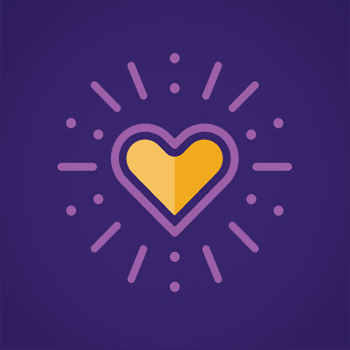
The novel coronavirus presents additional, potentially life-threatening, risks to healthcare workers. Laurier has made 150 apartment-style residence beds available to frontline staff at Grand River Hospital in Kitchener who choose to live away from their families and loved ones during COVID-19. The arrangement is part of a larger agreement with hospitals across Waterloo Region and Wellington County, which includes up to 300 Laurier residence spaces for use should an increase in overflow hospital space be required.
“This situation has brought our hospitals and community partners together in ways that we never anticipated,” says Ron Gagnon, president and chief executive officer Grand River Hospital. “We continue to be humbled by the response of so many in the community who are leaning in to support the regional health system and enabling us to manage a potential surge in need.”
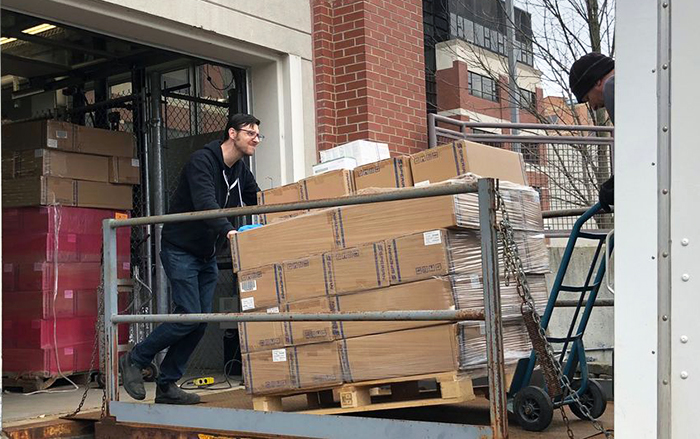
Laurier donated thousands of pieces of personal protective equipment to Grand River Hospital in Kitchener and the Brant Community Healthcare System in Brantford.
In addition to providing healthcare workers a temporary, safe place to call home, Laurier has provided thousands of pieces of personal protective equipment to healthcare systems in Kitchener-Waterloo and Brantford. Nearly 21,000 N95 masks, 38,700 pairs of disposable gloves and 250 isolation gowns, along with surgical masks, plastic visors, goggles, hand sanitizer and test kits, have been donated to Grand River Hospital in Kitchener and the Brant Community Healthcare System in Brantford. Laurier’s Student Wellness Centres, the department of Safety, Health, Environment and Risk Management and labs within the Faculty of Science and the Faculty of Human and Social Sciences donated the supplies.
“We are very grateful for Laurier’s generous donation of personal protective equipment to the Brant Community Healthcare System during these challenging times,” says Dr. David McNeil, president and chief executive officer of Brant Community Healthcare System. “The donation is helping to keep our healthcare workers safe while they are delivering exceptional care to our patients and their families and continuing the fight against COVID-19.”
While some university departments were able to donate personal protective equipment, others have contributed to producing it. Laurier’s Science Maker Lab provided water chillers needed to cool laser cutters at InkSmith, a Kitchener-based educational technology company founded by alumnus Jeremy Hedges (BA '15). Hedges transformed InkSmith to produce 3D-printed face shields needed to protect frontline healthcare workers during COVID-19. The company dubbed its piece of personal protective equipment “the Canadian Shield” and is currently working to fill a federal government order for 10 million shields.
The Laurier Library Makerspace is also helping, rerouting its three, newly ordered 3D printers to the home of staff member Darin White, who has been printing plastic headbands used as part of face shields worn by frontline medical workers. More than 400 headbands have been printed using Makerspace printers, assembled and distributed to healthcare professionals in Waterloo Region in partnership with Kitchener’s Kwartzlab Makerspace.
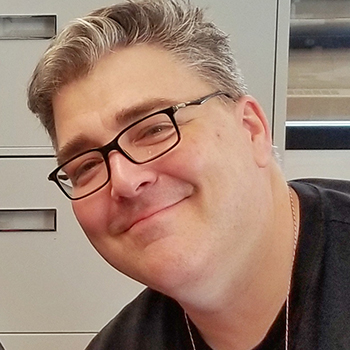
Laurier's Darin White has been using 3D printers to create plastic headbands used as part of face shields worn by frontline medical workers.
When a global pandemic was declared, working, learning and living remotely became a new reality. To help the community adapt, Laurier launched an online hub of personal and professional resources and programming developed by faculties and offices across the university.
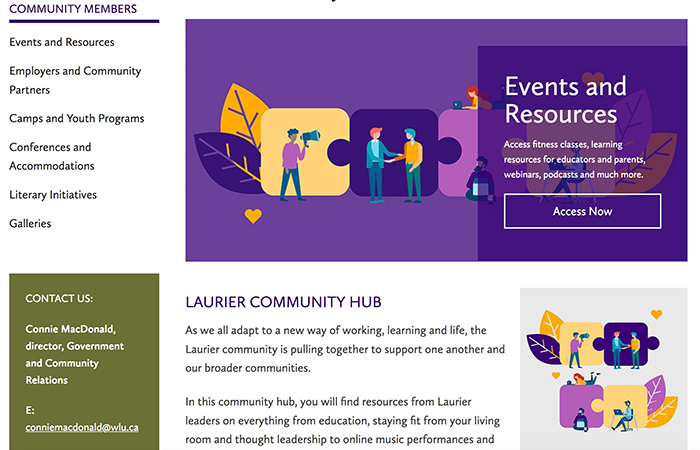
Laurier's online Community Hub.
Among the resources available are at-home learning strategies from Maria Cantalini-Williams, dean of the Faculty of Education, who offers advice about how to create a conducive learning environment for kids at home; professional development webinars from Alumni Relations about topics including career planning, conflict resolution and living sustainably; and virtual exercise programs offered by Department of Athletics and Recreation staff including dance, yoga and cardio classes.
“It was incredible to see how quickly Laurier staff, faculty and alumni mobilized to create content that could support people through such a challenging time,” says Connie MacDonald, Laurier's director of government and community relations.
“The hub has been a great way for Laurier to utilize its diverse programs and expertise to give back to our communities."
The community hub also includes access to the Essential Self-Care and Resilience course, a self-paced, online offering developed by Laurier’s Centre for Public Safety and Well-being. The five-module course is an adaptation of the centre’s Positive Psychology certificate program and covers topics including psychological, social and emotional self-care, resilience and stress.
“During times like these, it is more important than ever to be kind to ourselves,” says Holly Cox, manager of the Centre for Public Safety and Well-Being. “We wanted to provide the opportunity for more people to experience some of our self-care and resiliency material to help them get through this challenging time.”
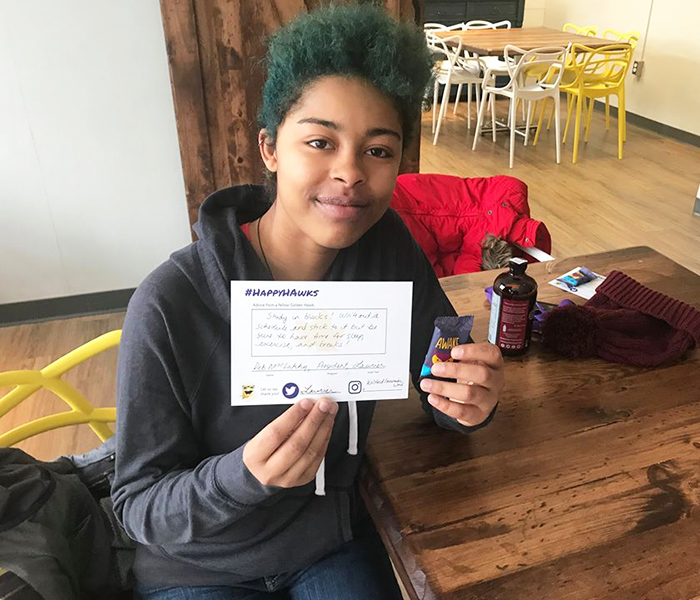
Hundreds of messages of encouragement were shared with Laurier students on social media as part of the #HappyHawks campaign.
Support and generosity continue to be reciprocal in the Laurier community. Friends of the university, alumni, faculty and staff have rallied behind Laurier students as they ended the winter term. Hundreds of messages of encouragement were shared on social media as part of the #HappyHawks campaign, which provides students with support during the final examination period each fall and winter.
The Laurier community has also stepped up to provide financial support for Laurier students impacted by COVID-19. Donations from the Wilfrid Laurier University Alumni Association, community members, alumni, faculty and staff to Laurier’s COVID-19 Emergency Fund continue to be received. The fund helps students who are struggling financially with essential living expenses.
“I am incredibly proud of the ways our community has come together to support each other during this challenging time,” says MacLatchy. “We will continue to do everything we can to keep our communities healthy and safe. We are in this together, and together we will get through it.”